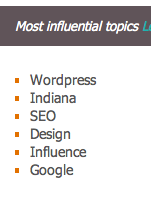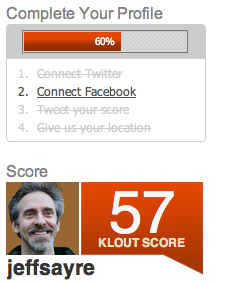I've Got a Clot in My Klout: Influence Across a Distributed Social Web.
I've been a fan of Klout since its inception. I was a relatively early adopter of its services and believer in its ideal to become the standard for influence measurement. I still use Klout and believe in their vision. Why else would I place a Klout widget on my About Me page?
But there are two issues that I wish to address. First, only one of the six listed most influential topics on my Klout profile make sense. Second, without connecting my Facebook account, I'm significantly penalized.
These two issues have big ramifications for those of use trying to build the Social Web.
Luke, Use the Foci
About three or four months ago, I tweeted the same observation concerning the most influential topics list on my Klout profile. Someone from Klout promptly @replied to my tweet stating that with continued use, the algorithms would more accurately determine my most influential topics. But this list has remained unchanged.
I have not bothered to check this assertion, but I believe that sixty percent of my time tweeting and ninety percent of my time writing is spent on the topic of a user-centric, distributed Social Web. This is divided between generic categories of Internet freedoms (GPL, open source in general, net neutrality, data portability, privacy, identity, BuddyPress) and Web 3.0 (Semantic Web/Linked Data, smartups, WebID, FOAF, RDFa).
Yet my Klout profile does not reflect any of that. In fact, "Indiana" is one of my listed most influential topics when I would guess that fewer than 1% of my tweets have used that word.
Of course, I could be wrong. Klout can scour my backtweets a lot more efficiently and effectively than I can. It may be that fewer of my tweets are about those topics than I realize, that few people retweet any of my tweets that are about my primary foci. Perhaps I engage in conversational chatter on Twitter more often than I think—although I do know for which issues most people retweet and @mention me.
Whatever the actual truth held within my Twitter data, I'd be very surprised if "Indiana, SEO, Design, Influence, Google" are my most popular topics. I rarely use any of those words in my Tweets or hashtags.
I do not spend my time within the dungeons of Mordor, I mean Facebook.
But it could quite possibly be that Klout is accurate, that those are my most influential topics. If so, that means that the vast majority of my time has been wasted, that I shouldn't bother tweeting about #privacy, #identity, #opensource, #Web30, #BuddyPress, #SemanticWeb, #WebID…etcetera.
I'm of course being somewhat facetious. But when the vast majority of my tweeting and blogging foci aren't reflected in the self-proclaimed "Standard for Influence", I have to wonder whether Klout's algorithms need some tweaking, or whether I've got a clot in my Klout.
Interestingly, and on a side note, influence is one of my most influential topics! In my mind that invokes a self-referential, infinite-looping, circular-referencing maelstrom.
An Audience with Sauron
Without connecting my Facebook profile to my Klout profile, I'm penalized forty percent—whatever that means, I don't like the sound of it.
Although I do have a Facebook account, I do not use Facebook. I think I have four or so people whose friendship I've accepted and who are obviously waiting with baited breath to see what I'm going to say. To date, I have not made a single wall post. So, they will be waiting for a lot longer as I plan to never post any content in Facebook.
In fact, I think in 2010, I may have bothered to login to Facebook three times and that was only to checkout one or two aspects of its interface.
Why don't I use Facebook? If you've been following my tweets and reading my articles posted to my site, you will already understand why. Facebook is antithetical to most of what I believe the Social Web is about. I'm professionally working on helping to bring the concept and infrastructure of the Social Web to fruition. Thus, I do not spend my time within the dungeons of Mordor, I mean Facebook.
Since I don't use Facebook, some of you may ask why I use Twitter then, as it too is just another private data island. Simple. Although Twitter is a participant in the closed-silo wars, my posted content is accessible to anyone who wants to see it. In other words, they do not have to be logged in to access my Stream. With Facebook, you must not only have an account but also be logged in and be a friend of that person to see their Stream.
As I'm trying to promote the concepts of an open, distributed, user-centric Social Web, Twitter lets me get the message out to everyone—whether they follow me or not, whether they're logged in or not, whether they have a Twitter account or not.
An Island of Misfit Toys
If Klout is to become the true measure, source, authority, standard for influence across the online world, then it needs to stop living exclusively within the social networking private clubs. Why? Because influence occurs across the Web-based and mobile-based Internet. It isn't restricted to closed social-media silos.
What about all of my online activity that occurs within my various blogs? Many people comment on my articles. What about the activity that occurs on forums, like the BuddyPress support forum where I'm a moderator (albeit a very inactive one lately)? What about on identica, or Diaspora, or the various niche BuddyPress sites that are beginning to pop up?
Conversations and influence flow beyond closed private data islands. Much activity occurs across the decentralized Web. In fact, for those of us fighting for the Social Web, we envision a day when most of the social activity will occur across a user-centric, decentralized, distributed architecture. The exclusive walled gardens of the Web will become a relic of the bygone, archaic Web-2.0 days.
Shouldn't this all be factored into my influence, into the influence of those who spend their time outside the Islands of Misfit Toys? Of course.
Does this really matter? Yes. As companies are beginning to use Klout scores to assess a potential candidate's job application, to determine if a particular person has sufficient expertise to be awarded a consulting contract, and other inevitably unknown purposes, the accuracy and integrity of that score becomes paramount to all the Web's citizens.
Jeff Sayre's Blog





